Department of Science and Technology Education
DeSTE attended the Re-configurations of Educational (In)Equality in a Digital World Seminar & Workshop
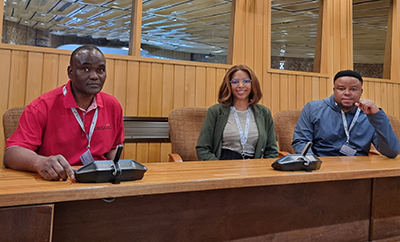 Colleagues from DeSTE recently participated in a seminar that delved into crucial topics shaping the landscape of education. The seminar covered a spectrum of subjects, including a global perspective on datafication, education, and inequality, featuring comprehensive reports from Mexico, Argentina, South Africa, Germany, and Sweden. Additionally, there was a focused critical dialogue addressing the promise of technology in alleviating the impact of educational inequalities. The event further unfolded with enlightening presentations by distinguished speakers. Isabel Tarling shared insights on systemic change across education contexts, providing evidence that data-informed decision-making is transforming learning and teaching. EduTabAfrica, represented by Maxwell Fundi, Patrick Njoroge, and Michael Mumbo, presented a thought-provoking discussion on the successes and challenges encountered in implementing ICT integration in offline contexts within Kenyan schools. The seminar served as a platform for valuable discussions and knowledge exchange on the dynamic intersection of data, technology, and education.
Colleagues from DeSTE recently participated in a seminar that delved into crucial topics shaping the landscape of education. The seminar covered a spectrum of subjects, including a global perspective on datafication, education, and inequality, featuring comprehensive reports from Mexico, Argentina, South Africa, Germany, and Sweden. Additionally, there was a focused critical dialogue addressing the promise of technology in alleviating the impact of educational inequalities. The event further unfolded with enlightening presentations by distinguished speakers. Isabel Tarling shared insights on systemic change across education contexts, providing evidence that data-informed decision-making is transforming learning and teaching. EduTabAfrica, represented by Maxwell Fundi, Patrick Njoroge, and Michael Mumbo, presented a thought-provoking discussion on the successes and challenges encountered in implementing ICT integration in offline contexts within Kenyan schools. The seminar served as a platform for valuable discussions and knowledge exchange on the dynamic intersection of data, technology, and education.
Colleagues further attended two workshops during the day out of the six provided:
WORKSHOP 1: Dr Isabel Tarling –Unpacking and refining Digital Standards for the Basic Education sector. How would we define good teaching using digital technologies? What would be the standards? What difference could ensuringdigital competencies of teachers make to students’ learning?
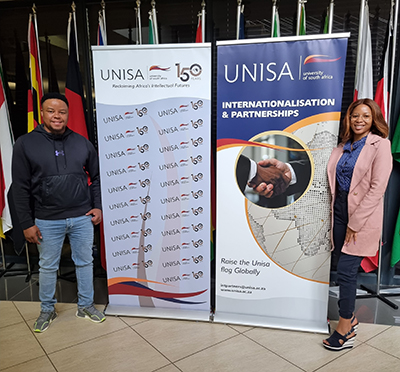 WORKSHOP 2: Maxwell Fundi, Patrick Njoroge and Michael Mumbo (Edutab Africa) –Offline Tools for ICT Integration and Teacher Professional Development Technology is increasingly becoming important in ensuring the provision of quality education. However, many educators face challenges in the use of technology due to limited internet connection and lack of adequate training opportunities. This hands-on workshop will introduce educators to ICT integration in education using tools such as interactive PHET simulations to improve student learning experiences, even in offline contexts. The workshop will demonstrate how to access the PHET simulations through interactions with the online site and ways to download the simulations offline. We will also demonstrate how the simulations can be built into a course that can used with Moodle App for both learners and teachers for professional development. The outcomes of this workshop for the attendees will be Increased awareness of offline that can be used in ICT integration, improved understanding of how to use offline ICT tools to improve student learning experiences, and Improved understanding of examples of digital content that can be used in ICT integration.
WORKSHOP 2: Maxwell Fundi, Patrick Njoroge and Michael Mumbo (Edutab Africa) –Offline Tools for ICT Integration and Teacher Professional Development Technology is increasingly becoming important in ensuring the provision of quality education. However, many educators face challenges in the use of technology due to limited internet connection and lack of adequate training opportunities. This hands-on workshop will introduce educators to ICT integration in education using tools such as interactive PHET simulations to improve student learning experiences, even in offline contexts. The workshop will demonstrate how to access the PHET simulations through interactions with the online site and ways to download the simulations offline. We will also demonstrate how the simulations can be built into a course that can used with Moodle App for both learners and teachers for professional development. The outcomes of this workshop for the attendees will be Increased awareness of offline that can be used in ICT integration, improved understanding of how to use offline ICT tools to improve student learning experiences, and Improved understanding of examples of digital content that can be used in ICT integration.
WORKSHOP 3: Felicitas Macgilchrist(Germany) -Design (for) justice Design shapes how we live our lives, including how we teach and learn. But who designs the educational technologies used in classrooms? Who benefits from these designs? Who is harmed by these designs? And who participates in the design process? This workshop introduces participants to "design justice". They will learn about design justice as a framework for analysis and as community of practitioners. They will discuss the key principles and apply the design justice framework to “generative AI” (ChatGPT) and other technologies that are relevant in educational settings. Participants will also consider alternative designs that distribute the burdens differently and aim to enable a more just and equitable education.
WORKSHOP 4: Thomas Hillman (Sweden) –InfraReveal Discover the hidden world of data exchange on the internet in this workshop and gain insights into the behind-the-scenes journeys of your data. While webpages and apps appear seamless, they are actually a collaboration of various hidden functionalities from different companies. When we browse websites, use learning management systems, or engage on social media, we unknowingly exchange data with numerous companies that provide the necessary functionalities for these experiences. In this workshop we will use InfraReveal, a tool designed to lift the veil, to reveal the intricate network of data sharing with the companies responsible for the services we use. By using this tool, we will explore the functionalities that shape our online experiences and examine the global actors and geographies behind them.
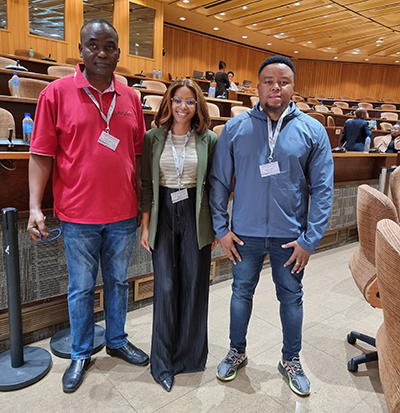
WORKSHOP 5: Federico Williams (Mexico) –Visual Using visuals/ethnography The attempt to produce ethnographic records of students' perspectives in today's schools can be a challenge, especially from a socio-material point of view. Such an approach invites the development of methodological strategies that are more sensitive to the number of actors involved in each assembly and to the practices of the subjects. It also gives a different role to so-called 'representations' of the students. In this sense, visual research methods offer a way of capturing students' voices from a different angle. One that is closer to their experiences. However, how this 'voice' is produced, whose voice it represents, and how the product of this research is used and interpreted are all issues of contention for researchers. This workshop will use a comic workshop conducted in Mexico and Argentina as an example of this oblique entry point, inviting participants to develop visual activities for working with students in schools with different levels of digitalisation.
WORKSHOP 6: Inés Dussel & Patricia Ferrante –YouTube videos for teaching and learning: (un) coupling knowledge practices in and out of schools in this workshop we explore and discuss uses of YouTube videos for teaching and learning from the perspectives of teachers and students. Based on research developed in Buenos Aires and Mexico City, we propose to reflect together about the strategies and criteria mobilized by teachers and students when they search, select, and use YouTube videos, including critical issues about platform mediation, authorship, and sources, and the challenges new instructional materials pose to educational practices.
Publish date: 2023-12-07 00:00:00.0

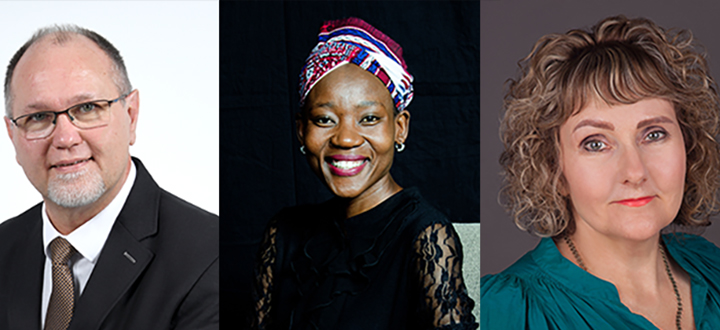 Unisa shows that developing countries are equal partners in research management and administration capacity development
Unisa shows that developing countries are equal partners in research management and administration capacity development
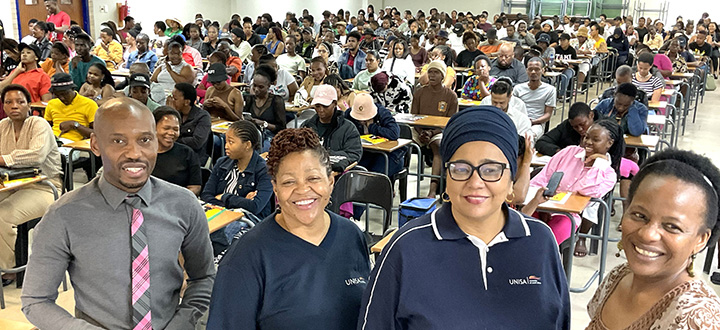 Unisa KZN Career Fair bridges the gap between students and employers
Unisa KZN Career Fair bridges the gap between students and employers
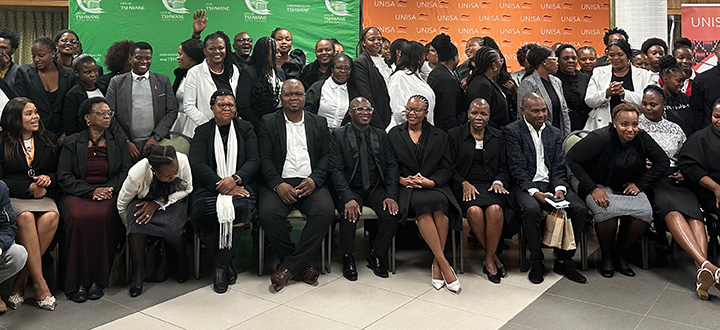 Unisa academics join hands to celebrate World Social Work Day
Unisa academics join hands to celebrate World Social Work Day
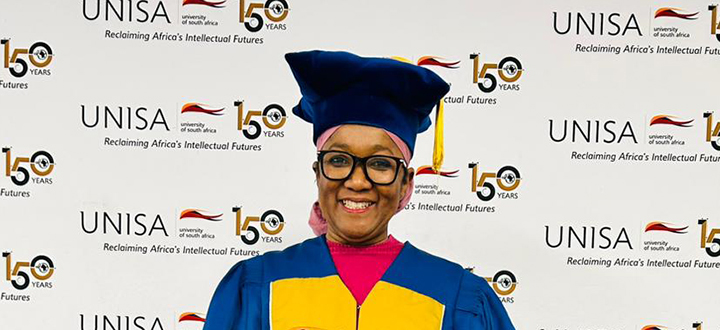 Unisa community engagement initiative targets school underperformance
Unisa community engagement initiative targets school underperformance
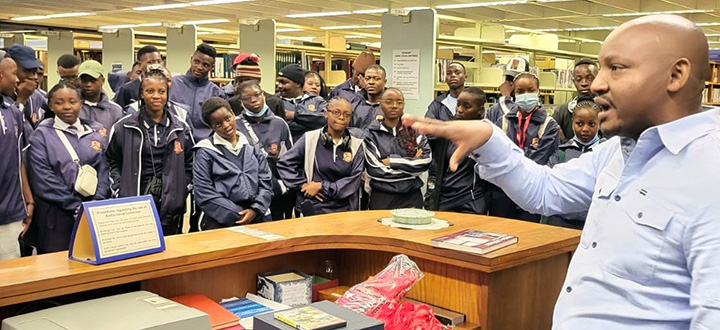 Library tour introduces learners to the wonderful world of Unisa
Library tour introduces learners to the wonderful world of Unisa